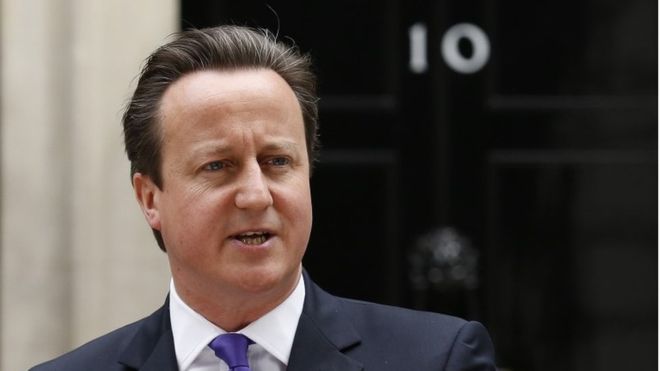‘David Cameron’s premiership damaged the UK’s LGBT community – equal marriage or not’
By Will Stroude

Former Prime Minister David Cameron announced today that he would be resigning as MP for Whitney with immediate affect, triggering a by-election in the Oxfordshire constituency.
Speaking to ITV News, Cameron said that he believed his continued presence in Parliament would be a “distraction” from government.
“In my view,” he explained, “with modern politics, with the circumstances of my resignation it isn’t really possible to be a proper backbench MP as a former prime minister.
“I think everything you do will become a big distraction and a big diversion from what the government needs to do for our country.”
Earlier this year he resigned as Prime Minister after the EU referendum resulted in the country choosing to leave the EU a result that Cameron had campaigned to avoid.
In his final Prime Ministers’ Questions, Cameron cited legalising same-sex marriage as one of his greatest political achievements. But besides marriage, how has Cameron’s political career helped – or hindered – the LGBT community?
Prior to his governmental career, Cameron’s voting record on LGBT rights was mixed. While never explicitly voting against LGBT equality laws, he was absent for votes on equal adoption in 2002, the repeal of Section 28 in 2003, and the gender recognition bill in 2004. Since then, he went on to vote in favour of LGBT equality.
While Cameron’s voting record suggests an increasingly liberal attitude towards LGBT rights, how did his government’s policies shape the lives of LGBT people? Same-sex marriage of course was a huge leap forward for the community, but for the most vulnerable LGBT people, austerity arguably exacerbated inequality in ways that being able to say “I do” can’t really help.

Same-sex marriage
Despite equal marriage coming into effect during a Conservative-led government, there’s not much to suggest that equal marriage had anything to do with the Conservative party at large. While Cameron has repeatedly spoken of his own personal support for same-sex marriage, his MPs were given a free vote on the issue.
Cameron may have supported gay marriage, but his refusal to apply the party whip for the vote suggests that he wasn’t willing to compromise his own reputation within the party to ensure equality reached LGB people.
The free vote itself spoke volumes about the party Cameron led: The majority of Tory MPs (58%) did not vote for equal marriage, and without the vast majority of Labour and Liberal Democrat MPs voting for equal marriage (84% and 80% respectively), the bill would not have passed.
Without pressuring his party to vote for equality, Cameron’s support for equal marriage was little more than lip-service to the movement, while the Tory goverment, rather than pushing the equality agenda, were merely in the right place at the right time, capitalising off the far more progressive views and vote of Labour and Lib Dem MPs.
Mental health services
The the six years of Cameron’s premiership, austerity has seen a year-on-year reduction in mental health provision for some of the most vulnerable people in the country. According to The Independent, demand for mental health services rose by 20% in the past five years, budgets for mental health services experienced a real-terms cut of around 8%.
The Independent reported that the effect of these cuts meant that in 2014, there were no mental health beds available for adults in the whole of England, while in 2015 an NSPCC survey found that over 20% of children referred to mental health services in England were refused treatment.
With a disproportionately high number of LGBT people experiencing mental health issues, cuts to services also disproportionately affect us. And mental health is just one area where Cameron’s austerity impacted the LGBT community more profoundly than the rest of society.
Housing
Earlier this year, the Communities and Local Government Select Committee blamed austerity for a 30% increase in homelessness between 2014 and Autumn 2015. While only around 5% of the population is LGBT, an Albert Kennedy Trust report revealed that in 2015, 25% of homeless people identified as LGBT.
Tim Sigsworth, the CEO of the Albert Kennedy Trust warned at the time that: “The proportion of mainstream housing providers targeting services at LGBT homeless people has dropped from 11% to 1% between 2011 and 2013.
“Homeless people, in particular those who identify as LGBT, have multiple and complex needs, and agencies within the UK are offering increasingly generic support due, in part, to a reduction in funds.”
For many young LGBT people, access to a safe and loving home comes down to the beliefs of their parents. Robust housing services are vital to those of us who experience rejection from our families – and thanks to austerity, those services were depleted.
HIV services
Writing for Attitude earlier this year, Marc Thompson, national co-ordinator of HIV support organisation Project 100, criticised austerity policy for their devastating effect on HIV services.
“The cuts o HIV prevention work and to sexual health services is appalling,” he said. “It’s not the way to go for providing support, advice, information or any kind of work for people living with, or affected by, HIV.
“With both access to sexual health services and sexual healthcare outreach reduced over the course of the last Conservative government.”
This was corroborated by Stop HIV Cuts, who in May found that a “potential crisis” was looming in HIV services, “as only 62.5 per cent have reserves to last them for another three months (without additional funding). There are major fears that organisations will continue to close and vital HIV services will be lost.”
While services dwindled, under Cameron’s premiership HIV rates continued to rise, particularly among men who sleep with men.
So, how should we remember Cameron’s LGBT legacy?
There is no doubt that Cameron, regardless of his early voting record, believes in gay people’s right to live like everyone else.
But what he failed to understand as his austerity policies wreaked havoc on state-supplied services, was that as a community we typically rely on the state more than our non-LGBT counterparts. By reducing the state’s ability to support the most vulnerable, he’s ensured that more LGBT coping with issues like HIV or mental illness will slip through the safety net. When LGBT youth are kicked out of their homes by bigoted families, there is less provision to support them, thanks to austerity.
He may consider equal marriage may be the jewel in his socially liberal crown political crown, but Cameron’s policies hit LGBT people hard. Individuals may have survived unscathed by his cuts, but the damage to the community shouldn’t be erased from his legacy.
Josh Lee is a London-based writer and journalist. Follow him on Twitter @J_Manasa.
More stories:
The stunning moment a 12-year-old boy stood up to thousands of anti-gay demonstrators
Nyle DiMarco discusses sexuality and changing deaf lives in Attitude’s October issue
